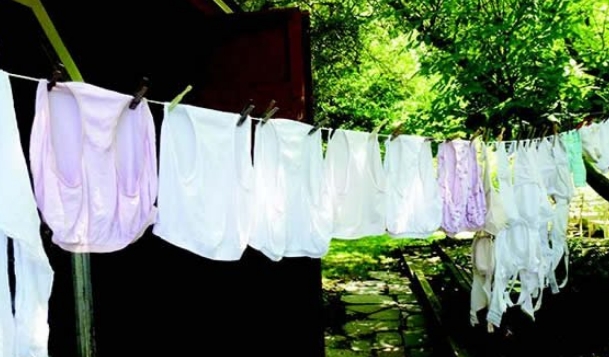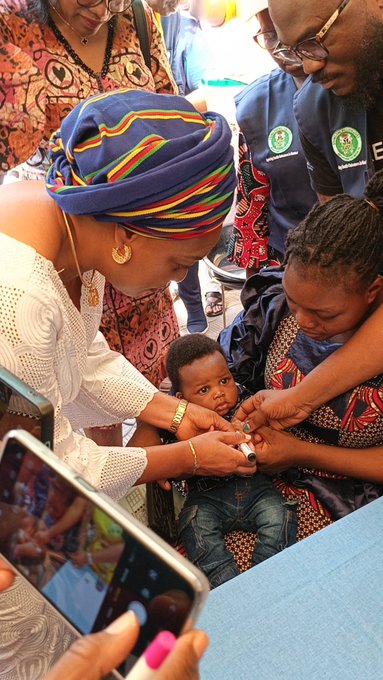Health
Why Women Should Not Wear Underwear For More Than 24 Hours —Expert

A Medical Laboratory Scientist, Obinna Chukwudi, has cautioned women against wearing underwear for more than 24 hours if they want to maintain good feminine hygiene.
The microbiologist who works at the Department of Microbiology, Nnamdi Azikiwe University Teaching Hospital, Nnewi, Anambra State, said the discharge and moisture buildup from the underwear provides a breeding ground for bacteria, and yeast infections contaminated with faecal and urine matter.
Speaking in an interview with PUNCH HealthWise, Chukwudi said the accumulated discharge and moisture can lead to a lingering foul odour and a change in vagina pH level.
According to him, “underwear should not be worn for more than 24 hours. If a woman wears a pant for more than 24 hours, what happens is that the bacteria must have accumulated over time because of the sweat and other secretions coming out, which you don’t usually see, and that is why over time you begin to see underwear changing colour – sometimes white and sometimes grey.
“The secretions stay there over time and if you do not wash it off after the 24 hours, the woman could develop infections. Again, there could be a change in vaginal pH, because of the secretions being produced which could lead to vaginosis.”
Experts say a normal vaginal pH level is between 3.8 and 4.5, which is moderately acidic.
READ ALSO: The dangers of eating too much restaurant food
According to them, an acidic vaginal environment creates a barrier that prevents unhealthy bacteria and yeast from multiplying and causing infection; but a high vaginal pH level — above 4.5 — provides an environment for unhealthy bacteria to grow.
Bacterial vaginosis is a type of vaginal inflammation caused by the overgrowth of bacteria naturally found in the vagina, which upsets the natural balance. Though many women with this condition have no signs and symptoms, experts say some signs and symptoms include thin, gray, white, or green vaginal discharge, foul-smelling ‘fishy’ vaginal odour, vaginal itching, and burning during urination. Many women with bacterial vaginosis, however, have no signs or symptoms.
According to an online health portal, Mayo Clinic – a medical center focused on integrated health care, education, and research – bacterial vaginosis results from an overgrowth of one of several bacteria naturally found in the vaginal.
“Usually, ‘good’ bacteria (lactobacilli) outnumber ‘bad’ bacteria (anaerobes). But, if there are too many anaerobic bacteria, they upset the natural balance of microorganisms in the vagina and cause bacterial vaginosis,” Mayo Clinic noted.
Continuing, Chukwudi said “vaginosis can cause discomfort and they can experience odour coming from the private part.
“For the men, you could pardon them because the penis is not in direct contact most of the time and the opening is not wide enough to have enough loads of bacteria. But ideally, underwear should not be worn for more than 24 hours.”
PUNCH
Health
LASG FLags Off Polio Outbreak Response Campaign

The Lagos State Government, through the Lagos State Primary Health Care Board, has launched the 2025 Polio Outbreak Response Campaign, reaffirming its commitment to eradicating polio and safeguarding the health of its children.
The ceremony, held at the Simpson Primary Healthcare Centre, was led by the First Lady of Lagos State, Dr. (Mrs.) Claudiana Ibijoke Sanwo-Olu, represented by Mrs. Widad Jumoke Mustafa, a member of the Committee of Wives of Lagos State Officials (COWLSO).
In her address, the First Lady emphasised the state government’s proactive measures to keep Lagos polio-free, highlighting the critical importance of the campaign in preventing the debilitating effects of poliomyelitis, which can result in paralysis or death.
READ ALSO: IMPEACHMENT: Lagos Ex-Speaker, Obasa’s ‘Sins’ Revealed
The First Lady also called on parents, community leaders, and stakeholders to support the campaign by ensuring eligible children are vaccinated.
Targeting children aged 0-59 months, vaccination teams will administer the Oral Polio Vaccine (OPV) to prevent virus transmission.
Dr. Kemi Ogunyemi, the Special Adviser on Health, expressed gratitude to Lagosians for their continued cooperation in the fight against polio. While appreciating all healthcare workers and partners for their services, Mrs. Ogunyemi encouraged parents to present their children and wards for the exercise.
Also speaking, the Chairman of Lagos Mainland Local Government, Mrs. Omolola Rashidat Essien opined that Immunization is key in ensuring that children are kept safe from polio and other vaccine preventable diseases.
Dr. Abimbola Bowale, the Supervising Permanent Secretary, Lagos State Primary Health Care Board, who also spoke at the event, underscored the life-saving importance of immunization.
“All children aged 0-59 months need multiple doses of the polio vaccine to ensure full protection. Any child missed represents a potential risk for the poliovirus to spread. The vaccine is safe, effective, and crucial in keeping our communities polio-free,” he stated.
Dr. Bowale also outlined several strategies to ensure the success of the campaign, including fixed post teams stationed at primary healthcare centres and public health facilities, house-to-house visits, and a transit strategy to reach special locations such as places of worship, schools, motor parks, and other public venues.
The event concluded with Dr. (Mrs.) Claudiana Ibijoke Sanwo-Olu officially launched the campaign, marking a renewed effort to maintain Lagos State’s polio-free status.
Headline
Lagos Cholera Cases Rise To 421

The Lagos state suspected cholera cases have risen to 421.
The Commissioner for Health, Akin Abayomi disclosed this on his Instagram handle @profakinabayomi on Saturday.
“As of June 20, 2024, an additional four suspected cholera cases have been reported, as illustrated in the accompanying graph,” he wrote.
He noted that the Emergency Operations Centre in collaboration with all relevant partners is actively engaged in contact tracing, community-based surveillance, awareness campaigns, sample testing, and ensuring that confirmed cholera cases receive appropriate medical treatment.
READ ALSO: Two Suspects Arrested For Stealing Car From Mosque During Juma’at Prayer
On Friday, the commissioner confirmed 35 cases out of the 417 suspected cases and 24 deaths across 20 Local Government Areas in the state.
The cases were reported from Agege, Badagry, Ikeja, Mushin, Ajeromi-Ifelofun, Epe, Ikorodu, Ojo, Alimosho, and Eti-Osa.
Others were Kosofe, Oshodi-Isolo, Amuwo-Odofin, Ibeju-Lekki, Lagos Island, Shomolu, Apapa, Ifako-Ijaiye, Lagos mainland, and Surulere.
Cholera is a food and water-borne disease caused by ingesting the bacteria— Vibrio cholerae — in contaminated water and food. Cholera can cause severe acute watery diarrhoea, and the severe forms of the disease can kill within hours if left untreated.
In Nigeria, cholera is an endemic and seasonal disease, occurring annually mostly during the rainy season and more frequently in areas with poor sanitation.
READ ALSO: Police Arrest 28yr Old Suspected Cultists, Recover Gun In Delta Community
The World Health Organisation on Thursday announced a spike in cholera in several regions of the world, with almost 195,000 cases and over 1,900 deaths reported in 24 countries since the start of 2024.
WHO said the Eastern Mediterranean Region reported the highest number of cases, followed by the African Region, the Region of the Americas, the Southeast Asia Region, and the European Region.
The global health body, however, noted that there are no reported cases in the Western Region, according to its bulletin released on Wednesday.
It said it exhausted its global stockpile of Oral Cholera Vaccines by March but was able to exceed “the emergency target of five million doses in early June for the first time in 2024.”
Health
AUTISM: What You Need To Know

By Silver Yeibake
Autism, commonly known as Autism Spectrum Disorder (ASD), is a neurodevelopmental disorder that affects communication, social interaction, and behavior. Autism is referred to as a spectrum condition since it can manifest in a variety of symptoms and abilities. While the actual cause of autism is unknown, evidence suggests that genetic and environmental factors interact to influence its development.
The risk factors include a sibling with autism, advanced age of parents, exposure to certain air pollutants and pesticides before birth, extreme prematurity, mothers with diabetes, immune system disorders or obesity, any difficulty with delivery leading to deprivation of oxygen to the baby’s brain, fever during pregnancy, lack of certain vitamins minerals during pregnancy, and certain genetic conditions, such as Down, fragile X, and Rett syndromes.
“Risk factors can not on their own cause a disease. However, they can increase the likelihood of that disease in a person.”
It is important to know that contrary to trending claims online, there is no scientific or medical evidence that vaccines or consumption of sugar are risk factors for autism.
READ ALSO: Kidney Stones: What You Need To Know
Autism is defined by difficulties in social interaction and communication. Individuals with autism may struggle to grasp social cues, maintain eye contact, and engage in typical back-and-forth conversations. Some people may also engage in meaningless, repetitive actions, such as hand-flapping or rocking, and have strong interests in specific areas.
It is essential to remember that autism is a lifelong diagnosis, but with early intervention and adequate care, people with autism can live fulfilling lives.
Autism treatment frequently includes behavioral therapy, speech therapy, occupational therapy, and social skills training. Each individual with autism is unique, thus interventions should be tailored to meet their personal needs and strengths.
In spite of the difficulties that autism can cause, many people with autism possess unique talents and abilities. Some people may succeed in fields such as music, art, mathematics, or programming, thus it is important for society to acknowledge and honor the qualities and achievements of people with autism.
In summary, autism is a complicated and diverse disorder that affects individuals in various ways. By raising autism knowledge, understanding, and acceptance, we can build a more inclusive society in which people with autism can thrive and attain their full potential.
Dr. Yeibake, Weriwoyingipre Silver.
Senior Registrar,
Faculty Of Pediatrics,
WACP

 Headline4 days ago
Headline4 days agoJUST IN: Soldiers Announce Military Takeover Of Govt In Benin Republic

 News4 days ago
News4 days agoRufai Oseni Breaks Silence On Alleged Suspension From Arise TV

 News4 days ago
News4 days agoOAU Unveils Seven-foot Bronze Statue Of Chief Obafemi Awolowo

 Politics3 days ago
Politics3 days agoJUST IN: Tinubu Holds Closed-door Meeting With Rivers, Ebonyi Govs

 News3 days ago
News3 days agoWhy My Lineage Qualifies Me For Awujale Throne — K1 De-Ultimate

 Metro5 days ago
Metro5 days agoJUST IN: Military Jet Crashes In Niger Community

 Politics3 days ago
Politics3 days agoTinubu, Six APC Governors Hold Closed-door Meeting At Aso Villa

 Entertainment5 days ago
Entertainment5 days agoShola Allyson Finally Reveals Why She Refuses To Reference Jesus In Her Songs [VIDEO]

 News4 days ago
News4 days agoWoman Taken For Dead Wakes Up Inside Coffin Few Minutes To Her Cremation

 Politics4 days ago
Politics4 days agoAmbassadorial Nominees: Ndume Asks Tinubu To Withdraw List




















